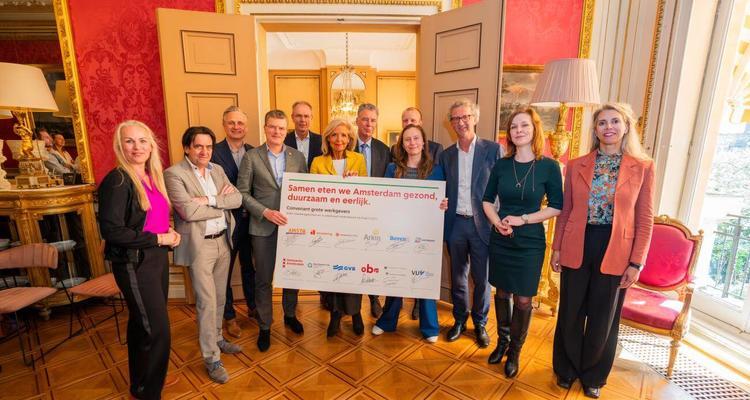
Feeding Change: Amsterdam’s Institutions Unite Behind a Shared Food Mission
What happens when hospitals, universities, libraries, and city offices align their menus with a shared vision for a healthier and fairer future? In Amsterdam, the answer is becoming clear: real momentum begins to build.
Twelve of the city’s major institutions including the Municipality of Amsterdam, the Vrije Universiteit (VU), University of Amsterdam and University of Applied Sciences, UMC Amsterdam, and the public transport company GVB have signed a powerful new food covenant: “Together We Make Amsterdam Healthy, Sustainable, and Fair.” These institutions collectively serve around 35,000 meals a day. That’s 35,000 daily opportunities to promote better health, support sustainable agriculture, and reduce food waste.
The goals set by this initiative for 2030 are ambitious:
- At least 60% of all proteins served will be plant based,
- A minimum of 80% of offerings will align with the Dutch Nutrition Centre’s guidelines,
- At least 25% of food purchased will be organic,
- Food waste will be reduced by 50% compared to 2015 levels.
While these targets reflect a shared ambition, what makes this moment truly significant is something less visible, yet vital: a mandate from the top.
For years, professionals within these institutions; caterers, sustainability officers and health advisors have been working on improving food environments. But what was often missing was a clear signal from leadership: the permission and support to make systemic changes. The signing of this new food covenant marks a turning point. It shows that boards and directors are now fully backing the transition, giving the internal changemakers the green light and the responsibility to move forward.
This shift didn’t happen overnight. It was initiated by the Municipality of Amsterdam whilst being part of FoodCLIC project. Together with the FoodCLIC coordinator Athena Institute at Vrije Universiteit Amsterdam and the FoodCLIC partner Voedsel Verbindt network, the project created the space for these organisations to come together, align their goals, and commit publicly to collective action.
Though a milestone has been reached, the journey is just beginning, now the real work begins. Translating shared goals into real changes on the ground, updating procurement policies, redesigning menus, tracking impact, and learning together as a Community of Practice.
One thing is certain: when institutions unite behind a shared vision and are empowered to act, meaningful change is possible. Amsterdam’s food transition is finally picking up steam.
- Written by our guest author and consortium member Ruben Smolders (Voedsel Verbindt)
Publishing date:
FOODCLIC. We are connecting people, food, policy & places.
FoodCLIC is a four-year project funded by the EU. The project runs from September 2022 to February 2027. The acronym FoodCLIC stands for 'integrated urban FOOD policies – developing sustainability Co-benefits, spatial Linkages, social Inclusion and sectoral Connections to transform food systems in city-regions

